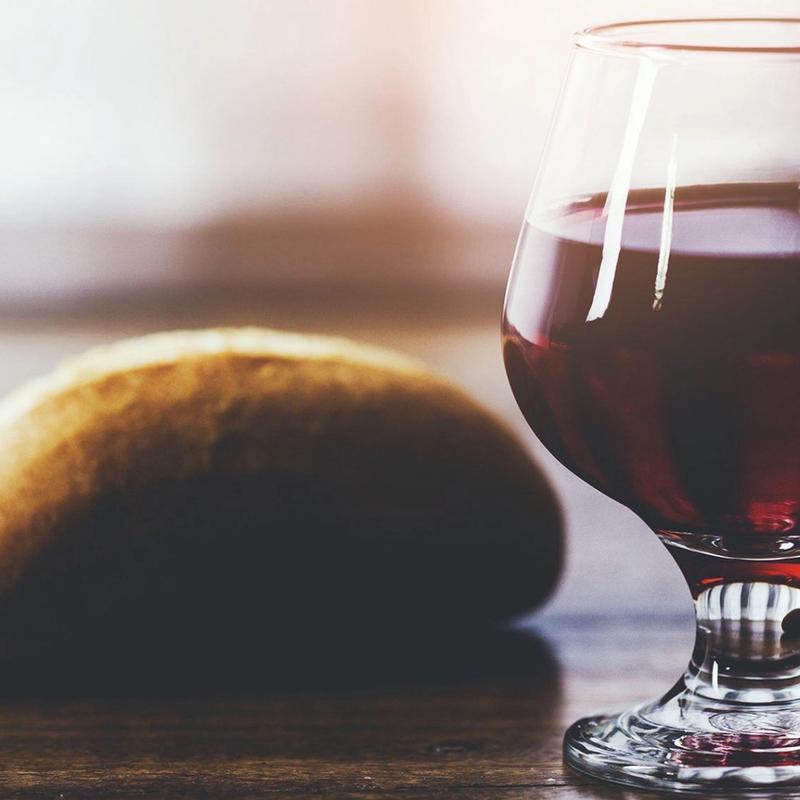Have you ever wondered what you’re supposed to be doing during the Lord’s Supper? Obviously, there’s eating and drinking. But for an essential ritual in the Christian faith it seems so simple and ordinary–is something “more” supposed to be going on?
Many people, as they hold the piece of bread or the cup of wine, don’t know what to do. Do I pray? If so, about what? Do I think really hard about what Christ has done? If so, how hard? Am I supposed to feel something? If so, what feeling? To aid us in our participation of this aspect of corporate worship, let me suggest three places for you to “look” while you join in the meal.
Looking Back in Faith
Looking back is the proper starting place; after all, it’s what Jesus Himself expressly laid out as a purpose of the Supper: “Do this in remembrance of Me” (Luke 22:19). Jesus gives us bread and wine as a means of awakening our faith to the mighty work of salvation that He accomplished with His body and blood on the tree. That’s what we’re meant to think back on as we partake of this meal.
It’s pretty remarkable the way in which our senses are linked to our memory. Certain sounds, tastes, or smells lodge themselves into our brain at a fixed time and place, so that whenever we encounter them again we’re drawn back in our minds to that former situation. But this varies from person to person depending on our experiences.
As Christians we all share the same history (“I have been crucified with Christ”), and so we’re meant to recall the same thing as we partake of the bread and wine. They are signs that bring our thoughts back in time to the finished work of Christ.
We can never be told to remember too often because we’re always forgetting! When you hear the breaking of the bread, remember the breaking of Christ’s body on the cross. When you see the wine poured out, remember the blood spilt for you. When you smell the wine, remember the pleasing aroma of Christ’s once-for-all sacrifice that satisfied the Father. When you taste the bread, remember that Christ is the bread from heaven that fills every spiritual need and strengthens us for our earthly pilgrimage.
Looking Forward in Hope
The Lord’s Supper is not merely about looking backward in faith to what Christ has done; it’s also about looking forward in hope for what Christ will one day do. Often Christians take the crucial memorial aspect of the Supper and stop there, to their own hurt. Yet “the meaning of the Supper is not the sum total of our unaided powers of reflection.”[1] There is so much more going on by God’s power and presence when we partake of the Lord’s Supper in true worship.
Isaiah 25 describes the glorious end of all things as being a great banquet between God and His people on Mount Zion. The Supper is a literal foretaste of our end-times eating with God. Our hope is that Christ has not gone up into Heaven forever, but will come again, and will bring us to that feast. That’s why when Christ instituted the Supper He ensured that we would look forward to it as well: “But I say to you, I will not drink of this fruit of the vine from now on until that day when I drink it new with you in My Father’s kingdom” (Matt. 26:29).
Jesus is referring to the new heavens and the new earth, and He promises His disciples–and us–that one that day we will feast together. Jesus blesses the bread and the wine to show we will be blessed as we partake of the Lord’s Supper. But ultimately the full blessing is still to come: “Blessed are those who are called to the marriage supper of the Lamb!” (Rev. 19:9).
Looking Out in Love
Finally, it’s essential when partaking of the Supper to remember the people around the table. We are to look out in love to our brothers and sisters in the church. We call it “communion” after all, because we’re communing, or fellowshipping, with each other! Paul writes, “We who are many are one body, for we all partake of the one bread” (1 Cor. 10:17).
This meal is the great uniting work in the church. Augustine liked to refer to it as the bond of love. This is the reason many congregations wait until the elements have been distributed to partake of them together, and the same reason you (hopefully) don’t start eating a meal until everyone present is seated. We wait to eat together because it’s a family meal. As the Lord’s Supper brings us to Christ, it also brings us to one another and is proof that we are part of one family. Again, here is a visible demonstration of an invisible reality: The Holy Spirit’s work within all of us, bringing us together into deeper conformity to Christ.
In the Supper, we learn we can’t love Christ without loving His people. To miss this outward-facing aspect of the Supper is to miss the Supper. Paul says if we partake of the meal in a selfish way, we haven’t truly fed on Christ: “When you come together, it’s not the Lord’s supper that you eat. For in eating, each one goes ahead with his own meal. One goes hungry, another gets drunk” (1 Cor. 11:20—21).
We show our union with the selfless, sacrificial Christ when we selflessly and sacrificially commune with His people. One of the best ways to prepare yourself to receive all that Christ prepares for you in the meal is to receive His people in love, grace, and charity. On Sunday we’re to rehearse what will be true of all of us on the last day: We overlook the faults of others, celebrate the gifts each member of the body has, and praise God that on this day we do not eat alone.
With these vistas before you, I pray you’ll be able to come to the table and, with the psalmist, “taste and see that the Lord is good!” (Psalm 34:8)
–
This article is adapted from Jonathan Landry Cruse, What Happens When We Worship (Reformation Heritage Books, 2020). Used with permission.
[1] Guy Waters, The Lord’s Supper (Wheaton, IL: Crossway, 2019), 93.






